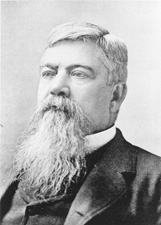Donelson Caffery facts for kids
Quick facts for kids
Donelson Caffery
|
|
|---|---|
 |
|
| United States Senator from Louisiana |
|
| In office December 31, 1892 – March 4, 1901 |
|
| Preceded by | Randall L. Gibson |
| Succeeded by | Murphy J. Foster |
| Personal details | |
| Born | September 10, 1835 Franklin, St. Mary Parish Louisiana, USA |
| Died | December 30, 1906 (aged 71) New Orleans, Louisiana |
| Political party | Democratic |
| Relations | Patrick T. Caffery (grandson) |
Donelson Caffery (born September 10, 1835 – died December 30, 1906) was an important American politician from the state of Louisiana. He was also a brave soldier during the American Civil War and owned a sugar plantation. He is best known for serving as a United States Senator.
Contents
Donelson Caffery: A Life in Politics
Early Life and Family
Donelson Caffery was born in Franklin, Louisiana. This town is the main city of St. Mary Parish. His family had a connection to a famous American leader. His great-grandfather, Colonel John Donelson, helped start the city of Nashville, Tennessee. Colonel Donelson was also the father-in-law of President Andrew Jackson.
Soldier and Lawyer
During the American Civil War, Caffery fought for the Confederate army. He served as a lieutenant in the 13th Louisiana Infantry Regiment. After the war ended, he became a lawyer. He also owned a sugar plantation.
Entering Politics
Caffery began his political career in Louisiana. He was elected to the Louisiana State Senate. He was a member of the Democratic Party. In 1892, he was chosen to serve in the United States Senate for Louisiana. He filled the remaining term of Randall L. Gibson, who had passed away.
In 1894, Caffery was elected by the Louisiana State Legislature to a full six-year term in the Senate. He served in this role until 1901. During his time in the Senate, he was known for being "anti-expansionist." This meant he was against the idea of the United States expanding its territory or power too much.
Presidential Nominations
In 1900, Donelson Caffery was offered the chance to run for President of the United States. A group called the "Democratic National Party" nominated him at their meeting in Indianapolis. However, he chose to decline this nomination.
Later that same year, another group also nominated him for President. This group was made up of "anti-imperialists" who met in New York. They also nominated Archibald M. Howe for Vice President. Caffery, being a strong Democrat, again refused this nomination. Howe also quickly withdrew his name. Caffery decided not to seek another full term in the Senate in 1900.
Senate Committees and Later Life
While in the Senate, Caffery held important leadership roles. From 1893 to 1894, he was the chairman of the Senate Committee on Enrolled Bills. This committee makes sure that bills passed by Congress are printed correctly. From 1899 to 1901, he chaired the Senate Committee on Corporations Organized in the District of Columbia.
After leaving the Senate in 1901, Caffery went back to practicing law. He passed away on December 30, 1906, in New Orleans, Louisiana. He was buried in Franklin Cemetery in his hometown of Franklin.
Family Legacy
Donelson Caffery's grandson, Patrick T. Caffery, also became a politician. He served one term in the Louisiana House of Representatives. He then served two terms in the United States House of Representatives from 1969 to 1973.
See also
 In Spanish: Donelson Caffery para niños
In Spanish: Donelson Caffery para niños

